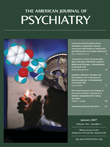A Randomized Trial of Integrated Group Therapy Versus Group Drug Counseling for Patients With Bipolar Disorder and Substance Dependence
Abstract
Objective: Although bipolar disorder and substance use disorder frequently co-occur, there is little information on the effectiveness of behavioral treatment for this population. Integrated group therapy, which addresses the two disorders simultaneously, was compared with group drug counseling, which focuses on substance use. The authors hypothesized that patients receiving integrated group therapy would have fewer days of substance use and fewer weeks ill with bipolar disorder. Method: A randomized controlled trial compared 20 weeks of integrated group therapy or group drug counseling with 3 months of posttreatment follow-up. Sixty-two patients with bipolar disorder and current substance dependence, treated with mood stabilizers for ≥2 weeks, were randomly assigned to integrated group therapy (N=31) or group drug counseling (N=31). The primary outcome measure was the number of days of substance use. The primary mood outcome was the number of weeks ill with a mood episode. Results: Intention-to-treat analysis revealed significantly fewer days of substance use for integrated group therapy patients during treatment and follow-up. Groups were similar in the number of weeks ill with bipolar disorder during treatment and follow-up, although integrated group therapy patients had more depressive and manic symptoms. Conclusions: Integrated group therapy, a new treatment developed specifically for patients with bipolar disorder and substance dependence, appears to be a promising approach to reduce substance use in this population.



